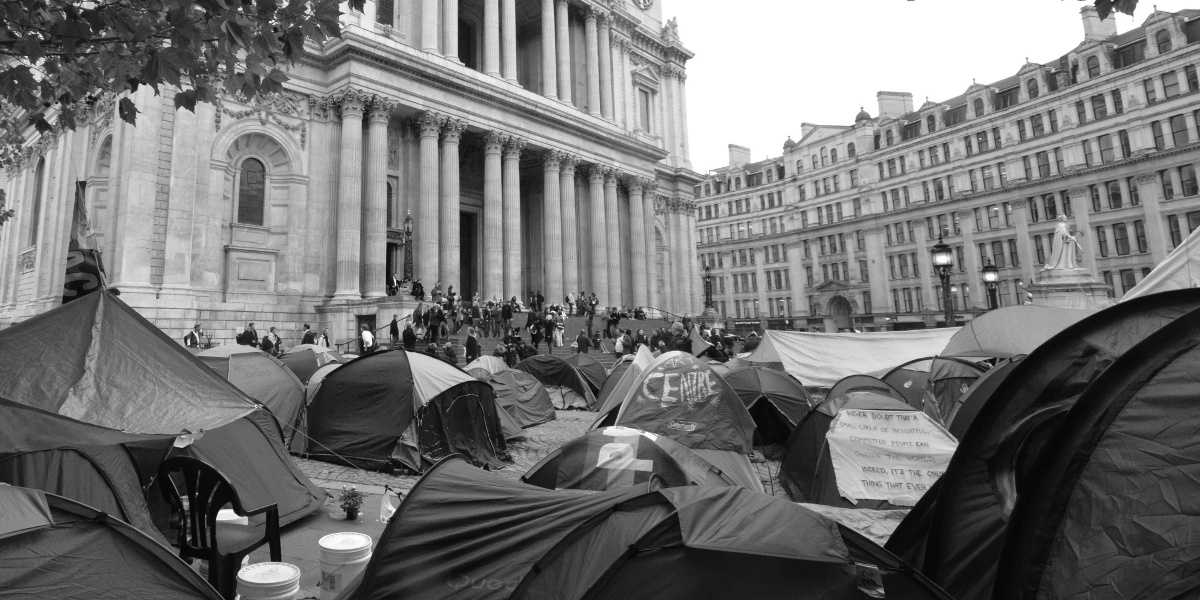Public speech needs public space
Last year’s Occupy protests shone a light on the problem of the privatisation of public space and the chilling effect this can have on political speech.When protestors first targeted the London Stock Exchange they were legally prevented from entering Paternoster...
Last year’s Occupy protests shone a light on the problem of the privatisation of public space and the chilling effect this can have on political speech.When protestors first targeted the London Stock Exchange they were legally prevented from entering Paternoster Square. The square is privately owned by the Mitsubishi Estate Company which took out an injunction against the protestors. They then moved their camp onto public land outside St Paul’s Cathedral where the camp remained for some months until the Corporation of London was able to persuade the courts that the removal of the protestors was justified. On public land, the Corporation had to justify the interference with the right to protest, whereas in the privately owned square the owners were not required to justify their exclusion of the protestors.
The Occupy movement, the Egyptian revolution and recent economic protests offer a powerful reminder of the symbolic importance of public space for political protest. While each of these movements has been catalysed by social media, their force derived from the mass gatherings in St Paul’s, Zucotti Park, Tahrir Square and other public spaces.
Taking to the streets is a cheap form of political activity. For those who lack the means to access the traditional media or lobby politicians, the right to assemble is a way of grabbing headlines and enhances political equality.
Legally, however, access to land for the purpose of political expression is at the discretion of the owner. As more land is sold to private companies and land already in private hands acquires increasing importance in community life, the number of spaces which can be used by political groups is under threat.
Since the 1980s, large parts of Britain’s cities have experienced regeneration funded by private investment which has extended private control over many of the country’s squares, gardens, highways and byways. Places like Canary Wharf and the Broadgate Centre epitomise how privately owned public spaces, designed to serve the needs of business, have become the norm.
Granary Square, a massive public space at the heart of the King’s Cross regeneration project opened with a sign which reads “Please enjoy this private estate considerately”. As Jeevan Vasgar of the Guardian writes, “the privatisation of space is now the standard price of redevelopment”.
Private money can have the positive effect of realising new publicly accessible spaces. In the case of the Olympic Park, what was largely deindustrialised wasteland has been transformed. Yet after the Games, much of this publicly accessible space will be given over to private developers to develop and manage.
The creeping privatisation of space is no accident but is the product of legal and policy regimes which favour this outcome. I want to suggest two possible ways to reform the status quo – the first would be to increase the provision of public space through the planning system and the second would be to create a legal right to political speech on privately owned but publicly accessible land.
Local planning authorities who prepare urban plans and develop planning policy often fail to require developers to provide public space as part of any new development. Whilst planning documents are filled with platitudes about increasing “public realm” this space is rarely public as a legal matter. Planning authorities should demand more public space both in their plans and in developers’ applications for planning consent. The Mayor of London has begun to lead the way on this with his recently published manifesto on public space which recognises the trend towards the private control of publicly accessible space. The manifesto suggests that the adoption of public space should be incorporated into all new development. This is a potentially important initiative. If proves to have a practical effect in London other parts of Britain may follow suit.
As well as policy reform, law reform may be needed. The rules of private property which allow owners to exclude anyone from their land without justification can stifle free expression where much “public” space is in fact privately owned. As I have written elsewhere, the state should not be able, through privatisation, to divest itself of its responsibility to protect people’s freedom of expression. One possible way to redress the imbalance between rights of property and freedoms of expression would be to recognise a right of reasonable access to publicly accessible property for the purposes of political expression.
On 21 June 2012 the Society of Labour Lawyers and the Fabian Society will bring together practising lawyers, academics and policy-makers to discuss the pressing issues surrounding the right to protest and the privatisation of public space. The timing of the workshop coincides with the run up to the Olympic Games and the advancement of large scale regeneration projects across our cities. The workshop will consider which the role freedom of expression and assembly play in our public life and ask whether the right balance is being struck between freedom of expression and other interests in private property and national security.
Sarah Sackman is a barrister and Chair of the Society of Labour Lawyers Communities and Environment Group. She is also a guest lecturer on the LSE Cities programme
